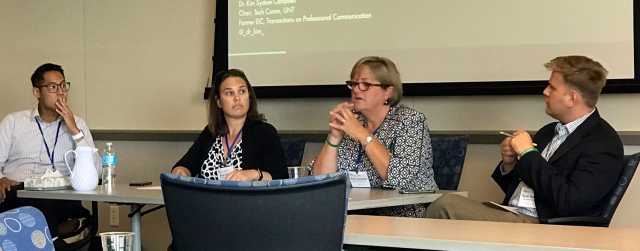
Four faculty members from the department presented research at the conference, as well as leading a discussion of the future of research in the field of professional and technical communication. The panel, "Are we missing the boat? A roundtable discussion on research methods and how they define our field," drew attendees from across the globe. The participants (from left to right) were Dr. Chris Lam, Dr. Erin Friess, Dr. Kim Sydow Campbell, and Dr. Ryan Boettger.
Dr. Boettger and Dr. Lam also led another panel: "Improving the data information literacies of technical communication undergraduates." With a colleague from Kennesaw State, they offered evidence of the need for increased data information literacy in three case histories recorded in three unique classroom settings: a content analysis course, a SEO and website analytics course, and a UX app development and design course.
Dr. Friess also presented "I guess I'll give it a 13: Exploring the language of agile-oriented software engineering teams." Her study of linguistic certainty usage of team members showed that, while sex affected certainty little, the members' team roles (e.g., developer, architect, tech writer, etc.) and the type of meeting (e.g., planning, kick-off, maintenance, etc.) resulted in different patterns of certainty markers.
Dr. Campbell's additional presentation with colleagues from the University of Alabama titled "Hard- and soft-sell marketing in white papers" established the advertising qualities of this content marketing genre. The most important qualities for differentiating among white papers were emotional (creative, imaginative, abstract, & interpretive), which accounted for one-third of all marketing appeals in a typical white paper, and rational (logical & precise).
The annual ProComm conference is organized by the Professional Communication Society, an IEEE society dedicated to understanding and promoting effective communication in engineering, scientific, and other technical environments.

